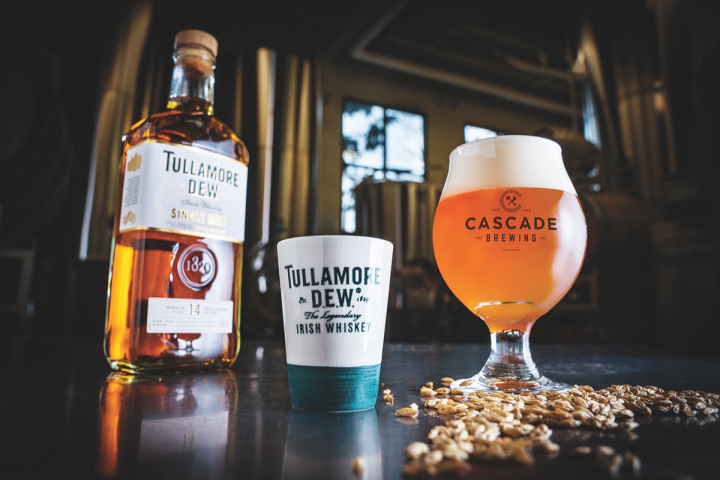
Beer marketers have cross-merchandised their brands with many consumer products over the years, but recent pairing programs are giving retailers pause. Increasingly, beer is being cross-promoted with spirits, its longtime rival, as marketers have discovered that the two categories can complement each other rather than compete. “Beer and whisk(e)y are good friends, if not cousins,” explains Andrew Nash, vice president of marketing at William Grant & Sons.
The company has been promoting the “DEW & a Brew” on-premise Boilermaker program with Tullamore DEW Irish whiskey for the last few years. The 4-year-old program has featured glassware, drip mats, visits by brand ambassadors and special pricing (where legal) at on-premise venues. Off-premise, the campaign offers generic co-branding POS, encouraging consumers to “grab a six-pack of their favorite craft beer, along with Tullamore DEW,” Nash notes.
Cross-merchandising often occurs when brands are owned by the same company. Diageo, for example, frequently cross-promotes Guinness with its whiskey brands, highlighting the Guinness Swirl—6 ounces of Guinness Draught stout with 1½ ounces of Crown Royal Vanilla flavored whisky—and the Bulleit Boilermaker—a shot of Bulleit Bourbon paired with Guinness. Constellation Brands cross-promoted Corona Extra with Casa Noble Tequila in 2016 during Cinco de Mayo, while Corona television ads also featured the Tequila brand. The program has been extended to this year as well.
Merchandising that pairs beer and spirits with no ownership connection is also on the rise. Dos Equis, imported by Heineken USA, is teaming up with Jose Cuervo and On The Border chips this Cinco de Mayo for an off-premise merchandising program. Tullamore DEW, meanwhile, hasn’t partnered with any specific beer brands for its Boilermaker promotion, although recent programming has focused on craft brews. Earlier this year, the Irish whiskey launched a multicity tour, sponsored by media company Time Out North America. As part of the campaign, a Tullamore DEW brand ambassador visited craft breweries around the country to educate consumers about pairing beer with the whiskey. The tour also featured collaborations between the breweries and Tullamore DEW that resulted in beers crafted to pair with the whiskey.
David Clarke, partner at the two-unit Cooper Craft & Kitchen in New York City, says the “DEW & a Brew” program has enabled waitstaff to educate guests on beer and whiskey pairings. “With the growth and popularity of craft beer, including aging beers in whisk(e)y barrels, consumers are becoming more aware of the synergy between beer and whisk(e)y,” he says. Cooper Craft & Kitchen offers 28 beers on draft, generally priced at $7 to $9 a 16-ounce pour.
Marie Greguska, co-owner of the two-unit Discount Liquor in Milwaukee, says cross-merchandising programs don’t always work. She describes an effort by Guinness and Baileys Irish cream liqueur during St. Patrick’s Day as “a natural,” but cautions that pairing Mexican beers with Tequila doesn’t work in all markets. “You have to be sure customers who are buying the beer are also likely to buy the Tequila,” she explains.
Marketers concede that beer and spirits cross-pairing programs can be challenging to implement, even beyond the distribution quandaries and varying state and local legalities. “It’s difficult to find national partners that make sense for the brand, work effectively in all channels and are relevant to most or all major retail partners,” says Heineken USA chief marketing officer Nuno Teles. Still, cross-programming provides numerous benefits to retailers, Teles adds, pointing to incremental sales, higher basket rings and space-saving display solutions.
Heineken USA will continue to pursue cross-merchandising opportunities with spirits brands that make sense. “We will always consider partnerships that are a natural fit, bring different resources to the table and are cost effective,” Teles says. “These promotions should deliver results that are greater than the sum of their parts.”